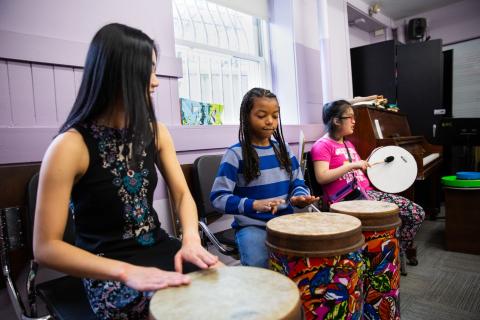Graduate Music Education Comes to Berklee College of Music

Young students explore drumming during a Berklee Institute for Arts Education and Special Needs–sponsored program.
Image by Elizabeth Friar
After years of successful and groundbreaking work under Boston Conservatory at Berklee's banner, Berklee's graduate music education programs—the M.M. in music education, the M.M. in music education (autism concentration), and the graduate certificate in music education and autism—will begin operating within Berklee College of Music's Music Education Department starting this summer.
Rhoda Bernard, managing director of the Berklee Institute for Accessible Arts Education (formerly the Berklee Institute for Arts Education and Special Needs) and the founder of all three programs, will continue to oversee the M.M. in music education (autism concentration) as well as the graduate certificate program—the only programs of their kind in the world. Cecil Adderley, chair of the college's Music Education Department, will oversee the general M.M. in music education.
"There is an enormous benefit to having all of music education in one place," says Adderley. "We have multiple faculty members who've taught at both institutions, but it's one big community. There has been that collaboration all along, so having it all in one place we can continue with that level of collaboration moving forward."
While the shift marks the beginning of a new era for Berklee's graduate music education programs, their core values and distinctive approach to contemporary music education remain unchanged.
Programs for Working Teachers
One of these values is ensuring that students enrolled in these programs—many of them working teachers—can keep their teaching jobs while they advance their careers through graduate-level training. This is why all three graduate programs are designed to accommodate a working teacher’s schedule by offering evening courses in the fall and spring semesters, as well as two full-time summer sessions. And during the academic year, students can participate remotely using web conferencing and student-directed study formats—a model these programs have been refining for years before COVID-19 made online learning a necessity at other institutions.
"I'm teaching a class tonight where I have five students on the web and four students in the room, and we are all together having class," says Bernard. "We've been doing hybrid and remote learning in graduate music education since long before it was sexy."
A Contemporary Approach to Music Education
While many music education programs still follow outdated models, graduate music education at Berklee is designed to help working teachers engage with the latest pedagogical, cultural, and technological shifts shaping today's learning environments. Students in these programs are trained to consider culturally responsive approaches to music education, and to understand and employ cutting-edge technologies to develop their lessons and aid their students with cloud-based technologies such as MusicFirst and SmartMusic.
"People today experience, consume, make, and interact with music in a wide range of ways," explains Bernard, "and we have now access to music from all over the world and from all throughout time in ways that we've never had before, and it has to change how we teach."
Berklee's music education faculty are internationally recognized as innovators in the field. Just this year Stefani Langol, associate professor of music education, was named 2021's Teacher of the Year by the Technology Institute for Music Educators (TI:ME).
Three Distinctive Programs
While all three programs share some basic traits—a flexible schedule, a contemporary approach, and an audition requirement that ensures all students share a level of musicianship—each is designed to serve educators and administrators in particular ways.
The two autism-focused programs are unique in the world. "Typically, when you train to be a music teacher, if you're lucky, you get one class about special ed students, and it's a class that's legal history and a lot of alphabet soup.... It is not about pedagogy," explains Bernard. "These classes are about how to teach students with disabilities. So it is very practical; it is about the actual work of that teaching."
The M.M. in music education (autism concentration) is for teachers with an undergraduate background in music or music education who wish to earn a master's degree with an autism focus. The graduate certificate in music education and autism is open to students with a broader undergraduate background who are interested in a focused study of this subject area but do not need or wish to pursue a master's degree.
The general M.M. in music education provides exceptionally customizable curricular pathways, through electives and through culminating experiences or theses, that enable students to craft unique subspecialties within their master's program. For example, some students have focused on community music and nonprofit programs, while others have focused on teaching nontraditional students, including indigenous populations.
Go deeper: In this podcast, learn more about how Rhoda Bernard and the Berklee Institute for Arts Education and Special Needs bring music education to those with special needs, and how the institute trains others to do the same.
